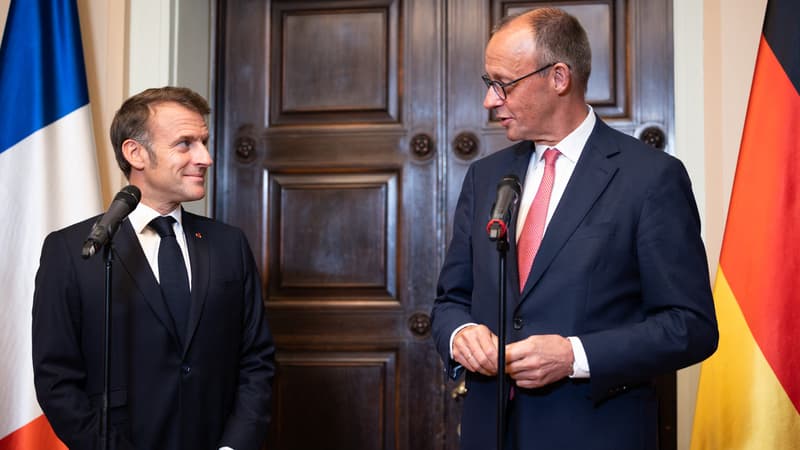After the Macron-Merz meeting, it is the turn of the ministers on both sides of the RIN to meet in Toulon this Friday, for the 26th Franco-German Ministers. On the defense side, Paris and Berlin are increasing cooperation projects, which have won a new magnitude since the invasion of Ukraine by Russia and the election of US President Donald Trump, but the two partners often face divergent interests.
Tensions for weapons purchases
The rearme in which European countries have been committed since the invasion of Ukraine by Russia in early 2022 brought to light tensions between France and Germany, among the desire to develop the European defense industry in the name of sovereignty and need to be quickly equipped.
These tensions were illustrated by the “Shield of the European sky” (ESSI) launched by Germany and to which around twenty countries have joined. In particular, it intends to trust the American anti-aircraft systems, to the Paris dam, which promotes the Franco-Titalian Samp-T system against the US patriot.
They are also found in the discussions within the EU on the edip support program for the European Defense Industry. Paris insists that the design authority is European design, so the production lines in Europe of US teams cannot benefit from European financing.
The future of the SCAF project questioned
In 2017, during Donald Trump’s first term, Emmanuel Macron and former German Chancer Angela Merkel (2005-2021) launched several cooperation programs. A few years later, some were abandoned (common maritime patrol plan, modernization of the attack helicopter, artillery project of the future). The others are struggling to advance, be it the Eurodrone Drone project, the future air combat system (SCAF) or the combat car (MGCS).
Regarding the MGCS, a program led by Germany, the two capitals achieved last year to find Forceps an agreement on the distribution of tasks between the French and German industrialists to develop it. But the official objective of having “the first contract at the end of January 2025” is not yet met, according to a source close to the file.
The SCAF is extended in tensions between Dassault French and Airbus, which represents the interests of Berlin and Madrid. Negotiations on the construction of the demonstrator are blocked, a kind of pre-prothotype of the future plane. Dassault wants to review the concluded agreements by claiming to have the freedom to choose his subcontractors himself. This requirement “does not simplify things,” said Friedrich Merz, according to whom the subject “will not be discussed” during Friday of the Franco-German Ministers. With Emmanuel Macron, “we will make a decision on the future of the SCAF project” in the “last quarter” together, he added.
Discussions to be composed of nuclear deterrence
Given the fear of American disconnection of Europe, German Foreign Affairs Friedrich Merz called after his choice to a discussion with London and Paris on nuclear deterrence so that Germany can “benefit from nuclear exchange, at least nuclear safety.” If the French deterrence is still independent, French president Emmanuel Macron reaffirmed in July to be ready to “start a strategic dialogue” on the subject.
According to him, German military officials are “pushed” by political power to “discuss with the French, sometimes against their will.” “They are very afraid that Americans will be misunderstood, as a kind of betrayal,” he explains.
A significant difference between ambitions and results
Despite the density of contacts between the two countries, “the gap between ambitions in defense cooperation and concrete results remains important,” says Johanna Möhring.
For Jacob Ross too, “we touch questions so close to the heart of French identity and German identity that is very difficult to move forward.”
Source: BFM TV


